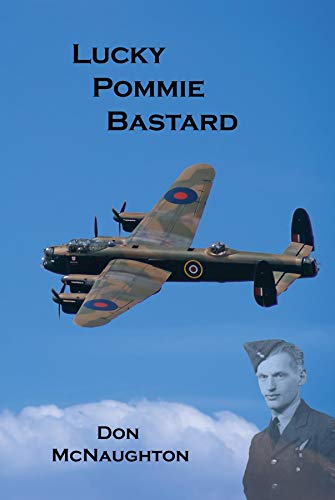Forced out of France, Britain faced the Battle of Britain in 1940 followed by the bombing of London and its industrial cities by the Luftwaffe.

RRP $19.99
For the island nation to forge a weapon capable of effectively striking targets in the enemy heartland, it had to create a new and stronger Bomber Command. To meet the demands for aircrew to man the bomber force, the Empire Air Training Scheme trained thousands of Australians and other citizens of the British Empire for the air campaign over Europe.
Lucky Pommie Bastard is the story of three Lancaster bomber crews each with an Australian pilot and a mixed crew of Australians and Britons who trained and flew together. It has a focus on the crew in which the author’s father, Roy McNaughton, served as a mid-upper gunner and is referred to as the Trimble crew, the name of the Australian pilot.
The author, Don McNaughton, was born in Durham, England, and emigrated with his family to Australia in
1961 at the age of nine. He served in the Royal Australian Air Force (RAAF) for four years from 1971 as an aeronautical engineer cadet. Now retired, he is Emeritus Professor of Molecular Sciences at Monash University, Melbourne, Australia. Lucky Pommie Bastard is his first book.
The book is presented in two parts: the predominant section addresses the training and operational activities of the three Lancaster crews, while the latter part recounts the family’s emigration to Australia and the experiences of the author.
Roy McNaughton and his crew survived 29 bombing missions in No. 207 Squadron, Royal Air Force, and No. 467 Squadron, RAAF. The description of their mission over Brunswick on 14/15 January 1944 captures the effort required to mount a raid. It describes the routine of the station personnel: briefing and planning staff, aircraft maintenance personnel, armourers, transport drivers, aircrew, the conduct of the mission, and the after-flight debriefing and routine. It captures the tensions, anxiety and hopes of those committed to the operation. To quote Doug Parry, a former World War II RAAF air gunner in Bomber Command: “The best description of a Bomber Command operation I have read”. I tend to agree with him.
Of the three crews that are the focus of the book, only the Trimble crew survived the war. Of the contingent of 10 Australian-led crews that formed in the United Kingdom at the same time, nine perished. The author provides details for each of these Australian-led crews. He also provides some very sobering details for each of the missions that the Trimble crew flew, including a copy of each combat report. Of interest, of the 17 aircraft that the Trimble crew flew, only one survived the war.
While many accounts of Bomber Command recount crew experiences, the pilot and his experiences are largely the focus and very few have a focus on the “other” crew members. Lucky Pommie Bastard, provides an interesting insight, placing an emphasis on the mid-upper gunners, or MUGS as they were known, and their challenges.
The author provides direct comment from Bomber Command war diaries, the Squadron Operational Record Book and Crew Combat Reports for each mission the Trimble crew flew. In doing so, he provides context and relevance for their actions, while the comments gleaned from the official accounts provide an insight into the stark reality of Bomber Command operations.
Despite the harsh reality of the time, the author has provided a warm, personal picture of the aircrew and their lives and the friendships they formed within the civilian community in Britain as well as their post-war outcomes – a tribute to camaraderie, commitment and compassion.
Roy McNaughton’s life in England following his demobilisation leads into the author’s account of the family emigration to Australia in 1961. The focus of the book then shifts to the experiences of a migrant family settling in Brisbane during the 1960s as ‘Ten Pound Poms’ as seen through the eyes of the author. It is a dramatic shift of focus away from life in Bomber Command.
The second, slightly smaller, part of the book provides a humorous, down-to-earth look at the life and tribulations of a teenage boy growing up in a foreign land. It is a warm account that will surely bring back memories to those of us who grew up in that era. It could easily stand as a separate book and would result in each book providing a thoroughly good read.
Regarding Bomber Command operations, the detail provided is incredible. The author has made a great effort to research the actions and fate of aircrews associated with the Trimble crew. The significant detail and the style of writing demands careful reading and the attention of the reader. That said, I believe the approach provides a compelling story and will capture the interest of the reader.
The part of Lucky Pommie Bastard dealing with Bomber Command will certainly appeal primarily to those interested in military history and will not disappoint, while the author’s experiences growing up in early Brisbane has general appeal.
Reviewed by Bob Treloar United Service 72 (2) June 2021
Contact Royal United Services Institute about this article.






